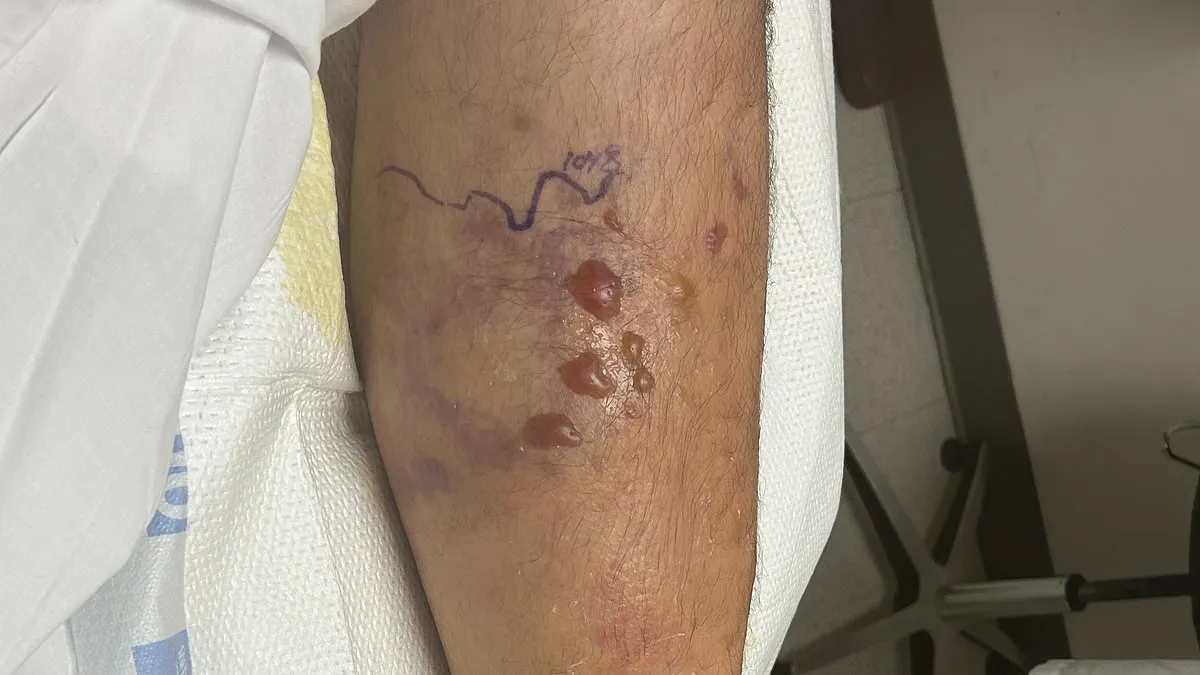
A fifth individual has tragically died after contracting a rare and dangerous flesh-eating bacteria in Louisiana, as health officials continue to issue urgent warnings about the rising cases of this deadly infection. The bacteria in question, Vibrio vulnificus, thrives in warm coastal waters and is particularly prevalent during the warmer months, specifically from May to October. This year alone, Louisiana has reported 26 confirmed infections, which is more than double the cases recorded in 2024.
The Centers for Disease Control and Prevention (CDC) has identified Vibrio vulnificus as a cause of necrotizing fasciitis, a severe condition that rapidly destroys skin and tissue. Alarmingly, about one in five individuals infected with this bacteria do not survive. As of now, the specific circumstances surrounding the latest victim's infection remain unclear, and the identity of the individual has not been disclosed.
According to the Louisiana Department of Health, infections typically occur when individuals expose open wounds to contaminated water or consume raw or undercooked seafood, particularly oysters. This year, the state health department confirmed that two of the deaths were linked directly to the consumption of raw oysters. Furthermore, 85% of those infected reported exposure through wounds and seawater, highlighting the significant risk factors associated with this bacteria.
Infections from Vibrio vulnificus are increasingly being reported across the Gulf Coast, with experts suggesting that rising ocean temperatures may be a contributing factor. "It's not just a Gulf Coast phenomenon any longer," stated Fred Lopez, an infectious disease specialist at LSU Health. "Global warming is moving infections with Vibrio vulnificus up the East Coast." Alongside the outbreak in Louisiana, Alabama has reported 10 cases (including one death), Mississippi has recorded three cases (one fatal), and Florida has seen 13 cases, resulting in eight fatalities. Alarmingly, cases have even been documented as far north as Massachusetts, leading to some oyster bed closures.
The Louisiana Department of Health noted that this year, the state is experiencing a significantly higher number of Vibrio cases and fatalities compared to previous years, where the average was just seven cases and one death annually. While mild cases of Vibrio infection may manifest as watery diarrhea, cramping, nausea, vomiting, and fever, severe cases can lead to bloodstream infections, dangerously low blood pressure, and necrotizing fasciitis. In extreme instances, surgical amputation may be necessary to remove dead or infected tissue.
Individuals with underlying health conditions, such as liver disease or cancer, are at a higher risk for developing life-threatening complications; however, the Louisiana Department of Health emphasizes that anyone can be affected by this bacteria.
In light of these alarming developments, the health department is advising the public to avoid brackish or salt water if they have open wounds, including cuts and scrapes. If exposure to potentially contaminated water is unavoidable, individuals are urged to cover their wounds with waterproof bandages. Furthermore, it is crucial to seek immediate medical attention if any skin infections develop following water exposure.
One alarming case involves Ben West, a 39-year-old who contracted Vibrio vulnificus after a family crabbing and mullet fishing trip on August 23 in Port St. Joe, Florida. Shortly after the trip, West experienced severe swelling and burning sensations in his foot and ankle. Despite his worsening condition, doctors initially misdiagnosed him with cellulitis and prescribed antibiotics. This incorrect diagnosis led to further complications, including severe blistering and a dangerously low blood pressure.
West's fiancée, Jamie Knowles, has been providing updates on his condition through a GoFundMe page established to help cover his medical expenses. In an update on August 29, she mentioned that after West's third surgery, doctors expressed confidence in having halted the progression of the bacteria.
The ongoing situation regarding Vibrio vulnificus infections in Louisiana and across the Gulf Coast serves as a stark reminder of the potential dangers associated with warm coastal waters and the consumption of raw seafood. Public awareness and adherence to safety guidelines are crucial in preventing further infections and protecting vulnerable individuals.